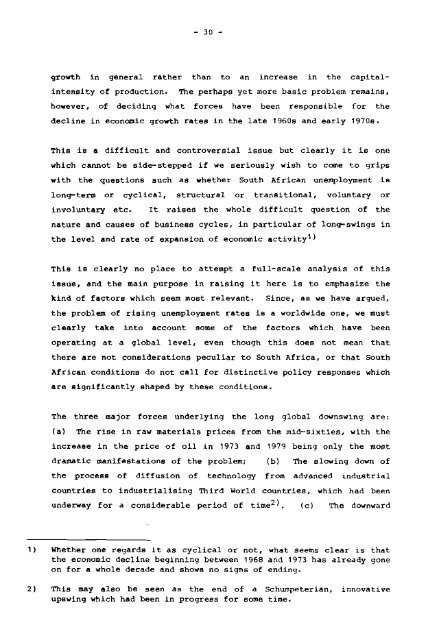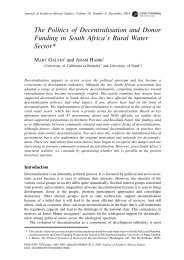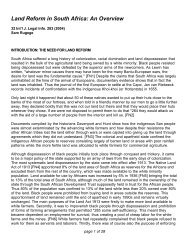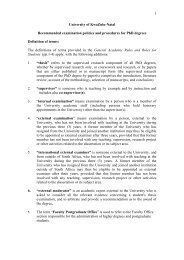Bell, Trevor : Unemployment in South Africa
Bell, Trevor : Unemployment in South Africa
Bell, Trevor : Unemployment in South Africa
Create successful ePaper yourself
Turn your PDF publications into a flip-book with our unique Google optimized e-Paper software.
grawth <strong>in</strong> general rather than to an <strong>in</strong>crease <strong>in</strong> the capital<strong>in</strong>tensity<br />
of production. The perhaps yet more basic problem rema<strong>in</strong>s,<br />
however, of decid<strong>in</strong>g what forces have been responsible for the<br />
decl<strong>in</strong>e <strong>in</strong> economic growth rates <strong>in</strong> the late 1960s and early 1970s.<br />
This is a difficult and controversial issue but clearly it is one<br />
vhich cannot be side-stepped if we seriouely wish to come to grips<br />
with the questions such as whether <strong>South</strong> <strong>Africa</strong>n unemployment is<br />
lon~term or cyclical, structural or transitional, voluntary or<br />
<strong>in</strong>voluntary etc.<br />
It raises the whole difficult question of the<br />
nature and causes of bus<strong>in</strong>ess cycles, <strong>in</strong> particular of lon~sw<strong>in</strong>gs <strong>in</strong><br />
the level and rate of expansion of economic activity1)<br />
This is clearly no place to attempt a full-scale analysis of this<br />
issue, and the ma<strong>in</strong> purpose <strong>in</strong> rais<strong>in</strong>g it here is to emphasize the<br />
k<strong>in</strong>d of factors vhich seem most relevant. S<strong>in</strong>ce, as we have argued,<br />
the problem of ris<strong>in</strong>g unemployment rates is a worldwide one, we must<br />
clearly take <strong>in</strong>to account some of the factors which have been<br />
operat<strong>in</strong>g at a global level, even though this does not mean that<br />
there are not considerations peculiar to <strong>South</strong> <strong>Africa</strong>, or that south<br />
<strong>Africa</strong>n conditions do not call for dist<strong>in</strong>ctive policy responses which<br />
are significantly shaped by these conditions.<br />
The three major forces underly<strong>in</strong>g the long global downsw<strong>in</strong>g are:<br />
(a) The rise <strong>in</strong> raw materials prices from the mid-sixties, with the<br />
<strong>in</strong>crease <strong>in</strong> the price of oil <strong>in</strong> 1973 and 1971 be<strong>in</strong>g only the most<br />
dramatic manifestations of the problem; (b) The slow<strong>in</strong>g down of<br />
the process of diffusion of technology from advanced <strong>in</strong>dustrial<br />
countries to <strong>in</strong>dustrialis<strong>in</strong>g Third World countries, which had been<br />
underway for a considerable period of time2). (c) The downward<br />
1) Whether one regards It as cyclical or not, what seems clear is that<br />
the economic decl<strong>in</strong>e beg<strong>in</strong>n<strong>in</strong>g between 1968 and 1973 has already gone<br />
on for a whole decade and shows no signs of end<strong>in</strong>g.<br />
2) This may also be seen as the end of a Schumpeterian, <strong>in</strong>novative<br />
upsv<strong>in</strong>g which had been <strong>in</strong> progress for Borne time.

















